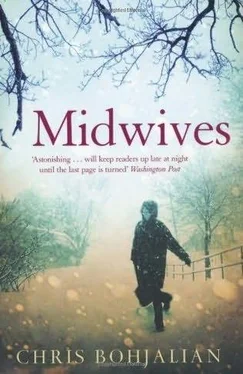Chris Bohjalian - Midwives
Здесь есть возможность читать онлайн «Chris Bohjalian - Midwives» весь текст электронной книги совершенно бесплатно (целиком полную версию без сокращений). В некоторых случаях можно слушать аудио, скачать через торрент в формате fb2 и присутствует краткое содержание. Жанр: Современная проза, на английском языке. Описание произведения, (предисловие) а так же отзывы посетителей доступны на портале библиотеки ЛибКат.
- Название:Midwives
- Автор:
- Жанр:
- Год:неизвестен
- ISBN:нет данных
- Рейтинг книги:5 / 5. Голосов: 1
-
Избранное:Добавить в избранное
- Отзывы:
-
Ваша оценка:
- 100
- 1
- 2
- 3
- 4
- 5
Midwives: краткое содержание, описание и аннотация
Предлагаем к чтению аннотацию, описание, краткое содержание или предисловие (зависит от того, что написал сам автор книги «Midwives»). Если вы не нашли необходимую информацию о книге — напишите в комментариях, мы постараемся отыскать её.
Midwives — читать онлайн бесплатно полную книгу (весь текст) целиком
Ниже представлен текст книги, разбитый по страницам. Система сохранения места последней прочитанной страницы, позволяет с удобством читать онлайн бесплатно книгу «Midwives», без необходимости каждый раз заново искать на чём Вы остановились. Поставьте закладку, и сможете в любой момент перейти на страницу, на которой закончили чтение.
Интервал:
Закладка:
"How much does he know?" my father asked, pushing the skin of a baked potato around his plate with his fork.
"About Charlotte?" my mother asked.
"Yes," my father said, after inhaling deeply and slowly so he wouldn't snap at her. But the sound of that breath murmured clearly, Of course. What the hell else could possibly be on his mind?
"I told him what I remembered. I told him the basics."
"When did you talk to him? Was it Saturday or Sunday? Or today?"
"As a matter of fact, it was Friday. Friday morning. I called him from the hospital before I even went home. Why? Do you think it matters when I called him?"
"Maybe. I don't know. I was just wondering whether he heard the story first from you, or from that… that creep who met you at the emergency room with the baby. The one who said all those ridiculous things to the newspapers. Dumond. Doctor Dumond." He said the word doctor as if he thought the fellow had earned his medical degree by mail, as if he had found the school on the inside of a matchbook cover.
"He heard it from me." Categorical, but defensive. A tone that would color more and more of my mother's remarks that year. And while that tone was wholly understandable, the combination of absolute surety and righteous stubbornness made it sound a bit like a whine, and I believe on occasion it did her no good.
I knew Dr. Hewitt's first name was Brian, but I had never heard him referred to as anything but B.P. Although he was more than a decade older than my parents, he still wore the nickname well he'd been given in medical school: B.P., a natural for a man hoping to become a doctor, whose first and middle initials were the abbreviation for blood pressure. His hair-vaguely camel-colored-was always flying around his forehead and flopping over the tops of his ears, and I can't recall ever noticing a line on his face. He had four sons, two of whom were close enough to my age that it was not uncommon for me to see the doctor around town: In my mind, I can still see his hair sticking out from underneath baseball caps, bicycle helmets, and the straw hat he wore one summer to a county fair in Orleans. It always seemed appropriate to me that he was the kind of doctor who delivered babies.
B.P. delivered his patients' babies in hospitals, of course, and he would testify that he believed hospitals were the safest place for newborns to arrive. But he also said he understood that some women were going to have their babies at home regardless of what he believed, and he was happy to back up the "right sort of midwife."
My mother, apparently, was the right sort of midwife. As her backup physician, he agreed to be on call to go to the hospital when my mother transferred one of her own patients there. Since my mother took women to the hospital only when she feared a complication-a slowly evolving difficulty such as a labor that just wasn't progressing, or the sudden and gut-wrenching chaos of fetal distress-this meant that the majority of the time B.P. met my mother there, he was anticipating a cesarean section.
In the nine years that B.P. had backed up my mother, the records would show that twenty-eight times my mother had transferred a patient to the hospital. Of those twenty-eight transfers-a small number, yes, but of course behind the vagaries of those digits lurk the terror and disappointment of twenty-eight women being rushed by ambulance or car from the warmth of their homes to the unknowns of a hospital, fearing with every movement (or pause) in their womb that their baby is dying-B.P. had been available twenty-six times. And of those twenty-six days or nights when he had met my mother at the hospital, on twenty-four occasions he had brought the laboring woman-usually silent with fear, although never, never numb-into an operating room and surgically removed the infant.
All but once the baby had been fine. Once the baby was stillborn. Born dead.
Never did a mother die.
And on that occasion when the baby was born dead, B.P. and the medical examiner were quite sure that the baby-a boy the parents would name Russell Bret-would have been born dead even if his mother had endured her labor in a hospital. If anyone believed that Russell Bret's parents made a mistake by attempting to have the child at home, I don't believe anyone said so. At least publicly. And no one, as far as I know, ever hinted that my mother might have been somehow to blame.
When B.P. arrived at our house that Monday night, he looked tired and preoccupied. I was immediately struck by the realization that this wasn't the carefree father I'd seen in the high-school bleachers watching his son play second base, or the serene dad I'd noticed bicycling back and forth with other sons on Hallock Street. He gave me a smile as my father walked him into the living room, but it was the sort of desperately wan grin I've since learned is the precursor to particularly bad news. I've always imagined that-along with doctors-accountants, mechanics, and the attorneys who handle death row appeals have a need for that grin often.
While he told my parents why he had stopped by, I cleaned up the kitchen. I was careful to make just enough noise that my parents would assume I was focused upon the dishes, but not so much that I couldn't hear most of what the adults were saying.
"She called about an hour after you did, Sibyl. Maybe forty-five minutes," B.P. told them.
"Friday morning?" my mother asked.
"Yup. Friday morning."
"She was that concerned?"
"Evidently."
"Why didn't she just call me?"
"Didn't she?"
"No."
"You two haven't spoken to each other since… since the birth?"
"Sibyl's been trying to reach her for three days," my father said. "Over the last three days, Sibyl has probably left a half-dozen messages on the woman's answering machine."
I slowed the water pouring from the tap to a trickle and dried my hands on the dish towel by the sink. I began to feel dizzy, as if I had stood up too quickly after kneeling for a long moment. They were talking about Anne, I realized, my mother's new apprentice. The woman who'd been with my mother at-to use B.P.'s term for the event-the birth.
I reached for the edge of the counter with both hands and leaned forward, trying to take some of the weight off my feet.
"You two haven't spoken, you two haven't seen each other?" The doctor's voice again. In it was something like surprise, something like concern. Concern for my mother.
"Nope," my mother said. "Not one word."
"I asked her to call you. Talk to you," B.P. continued.
"She didn't."
"Is she still in Vermont?" my father asked.
"I believe so."
"Then I'll see her tomorrow," my mother told B.P. "I have prenatal exams all afternoon, and Anne will assist me. We can talk about this whole affair then."
"Oh, I don't think so, Sibyl," B.P. said slowly, and I assumed the reason he had begun to speak at a slower speed was because he wanted to buy the time to find the right words for the point he was about to make. "If Anne hasn't already called you, I wouldn't expect her tomorrow."
"What exactly did Anne say to you?" My father. Suspicious.
"Tell me something first. If you don't mind. How well do you know Anne?" the doctor asked, and I could tell he was directing the question at my mother.
"I believe I know her well."
"But she hasn't been your apprentice very long."
"No, not long at all."
"About six months?"
"Not even that long. Three. Maybe four. We started working together in December."
"You're stalling, B.P., you're avoiding the issue. What did the girl say to you?" my father asked once more, his patience fading.
B.P. sighed. Finally: "When you made the incision into Mrs. Bedford to rescue the baby, she says she saw blood spurt. A couple of times. She says she thinks Mrs. Bedford was alive."
Читать дальшеИнтервал:
Закладка:
Похожие книги на «Midwives»
Представляем Вашему вниманию похожие книги на «Midwives» списком для выбора. Мы отобрали схожую по названию и смыслу литературу в надежде предоставить читателям больше вариантов отыскать новые, интересные, ещё непрочитанные произведения.
Обсуждение, отзывы о книге «Midwives» и просто собственные мнения читателей. Оставьте ваши комментарии, напишите, что Вы думаете о произведении, его смысле или главных героях. Укажите что конкретно понравилось, а что нет, и почему Вы так считаете.











